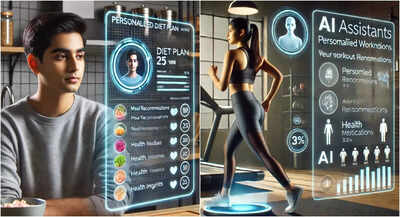Mumbai-based Shantanu Pednekar had doubts about portion control, Siliguri-based Avirup Nag sought a vegetarian-friendly fitness plan, and New Delhi’s Anjana PV needed easy standing exercises due to knee pain. While their concerns differed, they all found the same solution — AI tools that provided customised guidance, helping them stay on track with their fitness goals.
“I used AI and saw the results myself — it was effective. It helped me create a personalised fitness routine and made tracking progress easier and more motivating,” says Pednekar.
Experts warn against blindly following AI-recommended exercises without considering individual limitations. “Overreliance on AI can lead to poor form, overtraining, or lack of rest. It may also miss minor pain, increasing the risk of injury if not addressed in time,” says Kushal Pal Singh, fitness and performance expert at Anytime Fitness.

Image generated by AI: for representational purposes only
- Turning to AI for a customised diet
Siliguri-based Avirup Nag (26) has been experimenting with ChatGPT to tailor his diet plans. “Initially, I followed several fitness coaches and influencers on social media for healthy diet tips. As I prefer a vegetarian diet over a non-vegetarian one, I use AI tools to find suitable alternatives.” Another AI user, Shantanu Pednekar (23) says, “AI helps with portion sizes and nutrition but overlooks personal factors such as metabolism and cooking styles. While it is useful, human judgment remains essential.”
I’ve seen AI-generated diets suggesting impractical meals, like ‘chia seed pudding with spirulina and goji berries’ for breakfast. While healthy, such plans overlook local food preferences. Some even recommend excessive raw kale or quinoa, ignoring taste and digestion. AI is useful but often needs adjustments for realistic, palatable meals
Shantanu Pednekar, an AI enthusiast
- A substitute for a trainer
“For exercises, I rely on AI when a trainer is unavailable. I believe that at a beginner level, AI can be a useful guide. However, progress ultimately depends on our dedication to both diet and exercise. AI tools only provide the information — it is up to us to incorporate it into our routine,” Nag adds.
- ‘Adjust the plan based on progress or feedback prompted’
Anjana PV (27) recalls that when she wasn’t feeling well, the AI adjusted her meal and workout plan. “It advised me not to put too much stress on my body, especially if I had cramps, and to avoid putting pressure on my stomach.” She adds, “As for progress and feedback, it once provided me with a weekly plan. When I prompted AI, mentioning that I had lost a few kilos and asked if I should reduce my calorie intake further, it advised against it. Instead, it made some adjustments to my meals.”
REASONS TO USE AI‘Gives out detailed explanation’“AI offers detailed explanations for each query in a structured manner, backed by thorough research, which enhances subject understanding. However, we cannot follow all recommendations exactly as they are. While AI provides direction, structure, and research, it is essential to tweak them and add a human touch before applying them,” says Pednekar, who prefers using Perplexity AI for its user-friendly interface and well-researched data.
As per Anjana, using AI is pocket-friendly. Sharing her experience, she says, “It's cost-effective since I don't use the premium version of ChatGPT. Around six to seven months ago, I subscribed to a premium workout and personalised meal plan run by a personal fitness trainer and his team. It cost me approximately ₹3,500 for a month. However, a few months later, I realised that AI was suggesting the same things they had recommended. I realised it was almost identical to what I had done with the trainer.”
- ‘Offers virtual coaching, making training possible anywhere’
Experts say AI has changed fitness by providing personalised workout plans based on a person's goals, fitness level, and interests. “It gives real-time feedback and tracks progress. AI-powered apps also offer virtual coaching to ensure the right technique and provide diet advice, making training possible anywhere,” says fitness and performance expert Kushal Pal Singh.
REASONS NOT TO USE AI- ‘It relies only on the information provided to them’
Experts state that human trainers provide motivation, personalised adjustments, and injury prevention — something AI cannot fully replicate. “Advanced AI fitness protocols use user-inputted data and sensor feedback from wearables to consider injury history, and muscle imbalances. However, they rely only on the information provided to them. While AI can suggest workouts, human trainers can spot subtle movement issues and correct them in real-time,” says Kushal.
- ‘AI plans can be monotonous, whereas nutritionists ensure variety’
AI-generated diet plans rely on basic user data, which may not fully meet individual nutritional needs. Muskan Soni, a nutritionist explains, “Factors like mental and physical health, medical history, and lifestyle must be considered. AI plans can be monotonous, whereas nutritionists ensure variety, preventing diet fatigue and aiding consistency. Moreover, AI lacks personalised guidance, motivation, and progress reviews, which are crucial for helping individuals stay on track and achieve their fitness goals.”
- ‘AI-generated plans are suitable but miss key factors’
Soni adds, “No matter how advanced technology becomes, AI can never replace real nutrition experts. People often struggle to understand their calorie needs based on their lifestyle and diet. AI creates meal plans that may seem suitable but often overlook key factors like age, height, and individual requirements.”
In this day and age, you have to be able to use data and technology to your benefit. You shouldn’t become a slave to it, but there are certainly huge advantages to using AI. In the past, fitness and nutrition plans followed a generic, one-size-fits-all model, with training, diet, and routines being the same for everyone. But thanks to AI, a lot has changed. I always say that 'AI will not lift my weights for me, but it will definitely help me train better'. This combination is very important, and that’s what AI has done — it has allowed everyone to train the way they want... AI is widely discussed, but sometimes it gets overused and even misused in a broader context, leading to over-reliance on it
Suniel Shetty speaks at Mumbai Tech Week










